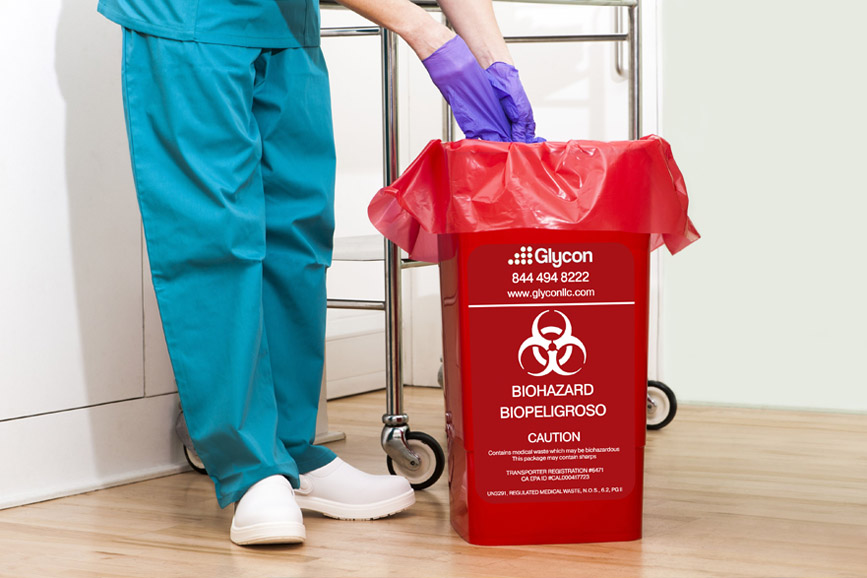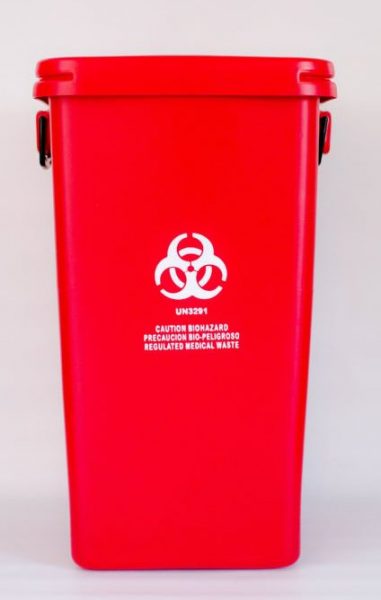Stay Compliant and Safe: Just How to Dispose of Medical Waste Correctly
In today's ever-changing medical care landscape, ensuring compliance and security when it comes to medical waste disposal is of utmost value. In this conversation, we will certainly explore the various types of medical waste, the involved dangers, the lawful demands, and the ideal techniques for keeping a certified and secure clinical waste monitoring system.
Importance of Proper Medical Garbage Disposal
Correct clinical garbage disposal is of utmost relevance in ensuring the safety and security and health of both medical care employees and the basic public. Clinical waste, which consists of products such as utilized needles, contaminated dressings, and expired medications, poses serious wellness threats otherwise managed and gotten rid of properly.

Additionally, incorrect disposal of medical waste can lead to ecological contamination. When clinical waste is not set apart, treated, or disposed of correctly, it can find its means right into garbage dumps or bodies of water, potentially polluting the air, water, or dirt sources. This can have destructive results on environments and human health and wellness, as dangerous substances might leach into the setting or be released into the atmosphere.
Kinds of Medical Waste and Their Risks
The varied variety of medical waste created by health care facilities offers different risks that have to be very carefully addressed to make certain appropriate disposal and avoid possible damage to public health and the atmosphere. Medical waste can be identified into various categories based upon its qualities and degree of danger.
One kind of medical waste is transmittable waste, which includes things that are polluted with blood or various other potentially transmittable materials. This can consist of used needles, syringes, and other sharp things, as well as cells, swabs, and dressings from patients with contagious diseases. Incorrect disposal of transmittable waste can result in the transmission of unsafe pathogens and the spread of infections.
One more group is contaminated materials, which consists of products that are harmful, combustible, harsh, or reactive. This can include chemicals, drugs, and particular medical gadgets. Messing up or improper disposal of contaminated materials can cause ecological contamination and pose dangers to the wellness of waste employees and the public.
Radioactive waste is one more kind of clinical waste that have to be thoroughly handled. This waste consists of products that have radioactive substances, such as utilized radiation therapy resources or infected research laboratory products. Improper handling or disposal of radioactive waste can result in radiation exposure and major health and wellness dangers.
Finally, non-hazardous basic waste, such as paper, product packaging products, and food waste, is additionally created by medical care centers. While this waste might not posture substantial threats, it still requires to be appropriately managed to maintain cleanliness and prevent the attraction of insects.
To guarantee the risk-free disposal of medical waste, healthcare facilities must apply correct partition, storage, therapy, and transport methods. This consists of utilizing suitable containers, labeling, and training for staff, as well as abiding by neighborhood guidelines and guidelines. By addressing the threats related to various kinds of medical waste, healthcare centers can secure public health and wellness and the atmosphere.
Legal and Regulatory Requirements for Disposal
In order to make certain the secure and proper disposal of medical waste, medical care facilities must abide by legal and governing demands. These needs are in place to secure public health and the setting from the potential threats related to clinical waste. Medical waste is identified as a special group of waste due to its possible to transmit transmittable diseases and consist of hazardous materials.

Some usual requirements include the partition and correct packaging of medical waste, the usage of accepted containers and labels, and the application of secure handling and transport procedures - medical waste removal services. Medical care centers may also be needed to preserve documents of their waste monitoring practices and offer paperwork to regulative authorities upon demand
Failing to adhere to these lawful and governing requirements can result in penalties, fines, and reputational damage for healthcare facilities. It is, for that reason, necessary for medical care providers to prioritize conformity and establish robust waste management protocols to guarantee the safe and proper disposal of clinical waste.
Ideal Practices for Safe Medical Waste Monitoring
Medical care centers need to stick to industry best techniques to make certain the efficient and risk-free management of clinical waste - medical waste disposal services with WasteX. Implementing these finest practices not just helps secure the environment and public wellness but likewise reduces the danger of potential legal and economic repercussions
Among the key finest practices is the appropriate partition and containment of various kinds of clinical waste. This includes using color-coded containers and clearly classifying them to guarantee that each kind of waste is gotten rid of appropriately. Furthermore, medical care centers ought to have marked locations for storage and disposal of medical waste, with clear read what he said standards and treatments in place.
One more vital aspect of risk-free clinical waste monitoring is the training and education of health care personnel. All employees that handle medical waste must obtain comprehensive training on the proper handling, storage, and disposal procedures. It is critical to ensure that team member know the possible threats connected with clinical waste and are equipped with the necessary understanding and skills to handle it safely.
Routine tracking and auditing of waste administration methods is likewise necessary. This entails routinely evaluating waste administration procedures, conducting evaluations, and maintaining accurate records. By monitoring waste management practices, medical care centers can recognize any type of prospective issues or areas for improvement and take rehabilitative activities appropriately.
Finally, healthcare centers need to focus on using environmentally friendly disposal approaches whenever feasible. This includes utilizing waste therapy innovations such as autoclaving or incineration, which can help in reducing the quantity and harmful nature of medical waste.
Eco-Friendly Solutions for Medical Garbage Disposal
Applying environment-friendly services for medical garbage disposal is important for healthcare centers to lessen environmental influence and guarantee sustainable methods. Conventional approaches of medical waste disposal, such as incineration and landfilling, have actually been found to launch damaging pollutants right into the air and contaminate dirt and water sources. Therefore, there is a growing requirement for alternative techniques that are both environmentally pleasant and safe.
One green service is the execution of on-site waste treatment systems. These systems make use of advanced modern technologies to safely refine clinical waste within the healthcare center itself. By dealing with the waste on-site, transportation exhausts and risks related to off-site disposal are lowered. Additionally, these systems usually employ sophisticated sanitation techniques, such as heavy steam or microwave therapy, to ensure the total devastation of infectious organisms.
One more green approach is the adoption of recycling programs for sure kinds of clinical waste. Materials such as glass, plastics, and metals can be recycled as opposed to disposed of in garbage dumps. By applying partition and recycling programs, healthcare facilities can considerably minimize their waste quantity and decrease their ecological impact.
In addition, medical care centers can discover making use of reusable clinical tools and products. By choosing multiple-use things, instead of single-use choices, the quantity of waste produced is substantially minimized. Recyclable products can be disinfected and utilized multiple times, resulting in cost financial savings and much less ecological effect.
Conclusion
In verdict, appropriate disposal of clinical waste is important for maintaining conformity and ensuring security. Following finest techniques for safe clinical waste management and checking out eco-friendly services can add to a liable and sustainable technique to waste disposal in the health care sector.
In this conversation, we will check out the numerous types of medical waste, the affiliated risks, the legal demands, and the ideal practices for maintaining a risk-free and certified medical waste administration system - medical waste removal service.One type of clinical waste is transmittable waste, which consists of items that are polluted this post with blood or other possibly contagious materials.Radioactive waste is another type of clinical waste that need to be meticulously managed. Medical waste is classified as a special classification of waste due to its prospective to transfer transmittable conditions and have harmful substances
Following best practices for safe medical waste management and exploring environmentally friendly services can contribute to a responsible and sustainable approach to waste disposal in the healthcare sector. medical waste disposal services with WasteX.